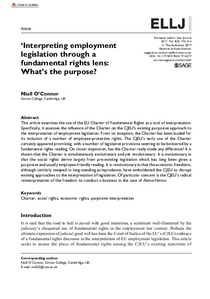‘Interpreting employment legislation through a fundamental rights lens: what's the purpose?

2017
8
3
September
193-216
labour law ; economic and social rights ; EU Charter of Fundamental Rights
Law
https://doi.org/10.1177/2031952517716277
English
"This article examines the use of the EU Charter of Fundamental Rights as a tool of interpretation. Specifically, it assesses the influence of the Charter on the CJEU's existing purposive approach to the interpretation of employment legislation. From its inception, the Charter has been lauded for its inclusion of a number of employee-protective rights. The CJEU's early use of the Charter certainly appeared promising, with a number of legislative provisions seeming to be bolstered by a fundamental rights reading. On closer inspection, has the Charter really made any difference? It is shown that the Charter is simultaneously evolutionary and yet revolutionary. It is evolutionary in that the social rights derive largely from pre-existing legislation which has long been given a purposive and usually employee-friendly reading. It is revolutionary in that the economic freedoms, although similarly steeped in long-standing jurisprudence, have emboldened the CJEU to disrupt existing approaches to the interpretation of legislation. Of particular concern is the CJEU's radical reinterpretation of the freedom to conduct a business in the case of Alemo-Herron. "
Digital
The ETUI is co-funded by the European Union. Views and opinions expressed are however those of the author(s) only and do not necessarily reflect those of the European Union or the ETUI.